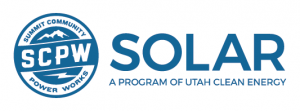For a limited time, (through May 1st, 2020) SCPW Solar is offering amazing discounts on residential solar PV projects to all eligible Summit and Wasatch County homeowners. After the historically low up-front investment, your residential solar PV system will, over the 25+ year lifetime of the system, help stabilize your electricity bills, provide a hedge against rising and volatile energy costs, and secure sizable energy savings. Solar is a low-maintenance, fuel-free energy resource; once it is installed, you can sit back, let the sun shine, and reap the savings for decades to come!
How Does the SCPW Solar Discount Work?
The SCPW installer is offering a flat-price discount on their products and services for the SCPW Solar Program.
With this discount, the average homeowner is expected to save up to 20% on their solar installation. The installer is also offering add-ons including battery backup, electric vehicle charging, and whole-home energy monitoring.
| Decription | 50% of Average Utah Home’s Energy Use | 100% of Average Utah Home’s Energy Use |
| System Size | 3 kW | 6 kW |
| Approx. Average Utah Price Before Incentives* | $9,500 | $18,600 |
| Approx. SCPW Solar Price Before Incentives* | $7,900 – $9,200 | $14,800 – $17,450 |
| Approx. SCPW Solar Price After Incentives* | $3,900 – $4,850 | $8,760 – $10,620 |
*Cost varies between equipment options. Prices do not include permitting fees. Costs included in the price table include a required $528 12-year data plan for system monitoring, a required $175 structural engineering assessment, and a required $265 net-metering fee for Rocky Mountain Power customers.
Average Utah prices derived from Energy Sage. The average Utah home uses 698 kWh/month or 8,376 kWh/year. Your solar energy offset will depend on your home’s annual energy use.
Customized Solar Bids
You will have the opportunity to customize your solar installation to meet your individual needs and personal energy goals. The selected contractor offers a few choices for panels, optional monitoring systems, and add-ons like those mentioned above for interested participants. Your customized solar bid and final discount will depend on the size of your solar PV system, selected components, and your ability to take advantage of available federal and state tax incentives.
Energy Efficiency
Creative Energies, SCPW, Summit County, and Utah Clean Energy are all committed to ensuring that SCPW Solar participants get the most out of their solar panels. By being more efficient and reducing your energy waste you can:
- Reduce your carbon footprint and household emissions
- Save money on your monthly utility bills
- Limit the up-front cost of going solar by reducing your home’s energy load
To maximize the impact of your solar, Creative Energies will help you understand your current energy use, identify simple areas of improvement (switching to LEDs, installing smart thermostats, improving your attic insulation, etc.), and use your energy goals to appropriately size your system.
Once you’ve identified your energy goals, you can use the SCPW Challenge to find resources, incentives, and how-to guides on over 70 actions that will make your goals a reality!
Solar Incentives
Right now really is the best time to go solar in Utah. In addition to the savings offered through SCPW Solar, the state and federal government both offer incentives to help reduce your final out-of-pocket costs.
| UT State Tax Credit | Federal Tax Credit | Solar Export Credit | |
| Rocky Mountain Power | 25% capped at $1,600 until 12/31/2020 25% capped at $1,200 until 12/31/2021 | 26% until 12/31/2020 22% between 1/1/2021 and 12/31/2021 | Homeowners are given 9.2 cents of credit for each kWh of energy sent to the grid. The Solar Export Credits generated can then be used in months where energy use is higher than energy produced by solar panels. The rate (9.2 cents/kWh) is changing later this year. Installing solar before the change locks in the current rate until 2032. |
| Heber Light and Power | 25% capped at $1,600 until 12/31/2020 25% capped at $1,200 until 12/31/2021 | 26% until 12/31/2020 22% between 1/1/2021 and 12/31/2021 | Extra energy sent to the grid results in a 1 kWh credit for every kWh generated. Unlike with Rocky Mountain Power, unused credits are purchased back by Heber Light and Power at the end of the service year. |
With the federal tax credit likely to decrease later this year, now is the time to take advantage of the lowest price for solar Utah will likely see in the near future.
Learn more about the Solar Export Credit that compensates Rocky Mountain Power customers for their excess generation here: https://rooftopsolar.utah.gov.
Financing
There are a number of financing options participants can take advantage of to lower the initial up-front cost of going solar. When considering financing, always review all terms and conditions and consider how the loan will be secured (for example, by the solar panels and equipment, by equity in your home, or by something else). SCPW Solar is not a tax expert and not qualified to provide tax advice, so always consult a professional if you are considering financing.
For more information, answers to commons questions, and a list of solar financiers doing business in Utah, additional information is available from Energy Sage.
Financing Options
Option 1: Clean Energy Credit Union
Thanks to Creative Energies’ partnership, SCPW Solar participants can finance their solar with the Clean Energy Credit Union (CECU). CECU, like Creative Energies, is a partner of the Amicus Solar Cooperative, which provides members with special deals by working as a purchasing cooperative.
CECU offers 100% financing split into two loans: a 70% Long-Term Solar Electric System Loan (12-Year) and a 30% Short-Term Tax Credit Loan (12-18 months). The loan is secured by the solar equipment installed (not by the equity in your home), and had no dealer fees and no loan origination fees. Their fixed interest rate is as low as 5.25% for qualified buyers.
CECU offers loans on other products including electric cars and bikes, geothermal heat pumps, and Green Home Improvements.
Option 2: Home Equity Line of Credit
Home Equity Lines of Credit (HELOCs) can sometimes provide participants who have a good credit score with a lower interest rate (5% or less). HELOCs are secured by the equity of your home, and not the solar panels, which is important to consider if you plan on selling your home before the loan is fully paid back.
Option 3: Solar-Specific Financing
Some banks and credit unions provide solar-specific financing; a selection of options doing business in Utah in provided below.
- Admiral’s Bank (FHA Title 1 Loan or Solar StepDown Loan)
- GoldenWest Credit Union (Energy-Efficient HELOC)
- LRB Financial (HELOC or Personal Property Loan)







